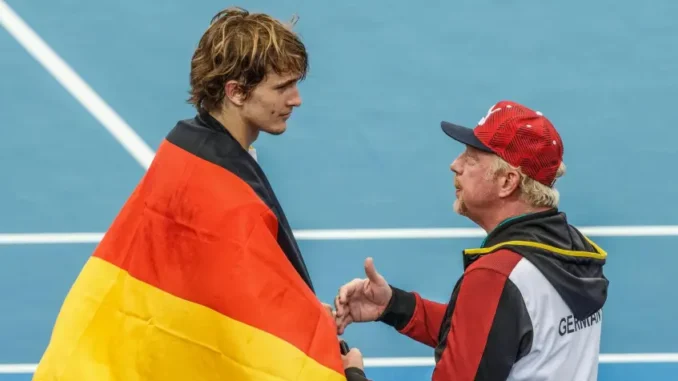
The tennis world was left stunned when Alexander Zverev, the world No. 3, suffered a shocking first-round defeat at Wimbledon 2025, but it was his heart-wrenching post-match press conference that left an indelible mark, bringing tears to the eyes of tennis legend Boris Becker. Zverev’s five-set loss to Arthur Rinderknech on July 1, 2025, ended with a scoreline of 6-7(3), 7-6(8), 3-6, 7-6(5), 4-6, but it was his candid admission of mental health struggles that overshadowed the result. The 28-year-old German’s raw vulnerability, as he spoke of feeling “empty” and lacking joy, resonated deeply with Becker, a three-time Wimbledon champion who has mentored Zverev for years. The emotional weight of the moment has sparked a broader conversation about mental health in professional sports.
Zverev’s defeat on Centre Court was a bitter pill, marking one of the biggest upsets of the tournament’s opening round. Coming off a strong 2025 season, including a runner-up finish at the Australian Open to Jannik Sinner, Zverev had high hopes for Wimbledon, where he reached the fourth round the previous year. However, his loss to the world No. 72 Rinderknech exposed cracks in his mental and emotional armor. In a poignant press conference, Zverev laid bare his struggles, admitting, “I’ve never felt this empty before. Just lacking joy, just lacking joy in everything that I do. It’s not necessarily about tennis. Just lacking joy outside of tennis, as well.” For the first time, he hinted at seeking professional help, adding, “Maybe for the first time in my life I’ll probably need it.”
Becker, watching the press conference live, was overcome with emotion. “I watched the press conference live and I cried,” he shared on his podcast alongside Andrea Petkovic. “A person opened up and said, ‘I have problems, I have mental problems, help me. I don’t have anyone around me except my daughter, who is four years old, with whom I like to spend time, where I laugh and smile.’” The 57-year-old, who has long seen Zverev as a “sporting protégé,” reached out immediately, receiving a thumbs-up emoji in response—a small but hopeful sign. “I have never seen him so honest, he basically revealed himself, let his emotions simmer and I found it incredibly sad,” Becker said, emphasizing his concern for Zverev’s well-being beyond the tennis court.
Becker’s emotional response highlighted his deep connection with Zverev, whom he has guided through highs and lows. “Tennis, he can play, he’ll win tournaments, he’ll lose a few, but how is he doing personally?” Becker asked, underscoring the importance of mental health for Zverev’s future. “And that’s a very important point for the rest of your life, because at some point your career will be over and it will be great. But how are you then? How are you as a person? What is your environment?” With Zverev currently taking time off in Ibiza to “let his soul tree,” Becker urged him to skip the upcoming Swiss Open in Gstaad. “My advice would be please, please, please, don’t play Gstaad,” he pleaded. “Take your girlfriend Sophia, go, you have a lot of money. Rent a boat, sail around the Aegean, do some island-hopping, but please come back to yourself as a person so you have the strength to succeed on the tennis court again.”
The German legend also critiqued Zverev’s support system, particularly his brother and manager, Mischa Zverev. Becker called Mischa’s role “strange,” noting his apparent detachment as an Amazon Prime analyst discussing his brother’s loss. “He lost a match, takes a few days off, and then Gstaad is on the schedule,” Mischa said, a comment Becker found “almost emotionless.” He argued that Mischa’s multiple roles—brother, manager, and commentator—created a conflict. “He has so many roles. On one hand, he must be a brother and care for his younger sibling. On the other, he’s a TV expert who must speak credibly but can’t criticize his brother,” Becker explained. This echoed his earlier advice after Zverev’s French Open quarterfinal loss to Novak Djokovic, where he suggested parting ways from his father and brother as coaches, a remark that drew a sharp response from Zverev.
Zverev’s openness about his struggles has resonated widely, with peers like Djokovic offering support. “If he needs me, I’m here,” Djokovic said, reflecting the tennis community’s solidarity. Zverev’s challenges extend beyond the court, as he referenced off-field pressures, saying, “I’ve been through a lot of difficulties in the media. I’ve been through a lot of difficulties in life, generally.” His planned four-week break before the Toronto Masters 1000 event signals a commitment to healing, but his vulnerability has already left a lasting impact. Becker’s tears and heartfelt plea underscore the urgency of addressing Zverev’s mental health, reminding fans and players alike that even the sport’s brightest stars face battles that transcend the game.
Leave a Reply